Related Research Articles
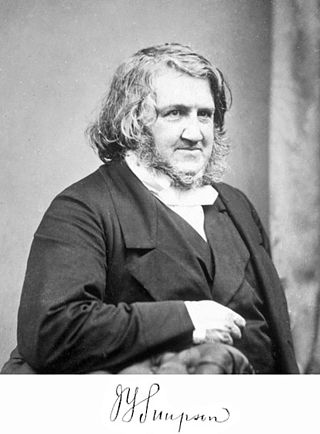
Sir James Young Simpson, 1st Baronet, was a Scottish obstetrician and a significant figure in the history of medicine. He was the first physician to demonstrate the anaesthetic properties of chloroform on humans and helped to popularise its use in medicine.

Ian Donald was an English physician who pioneered the diagnostic use of ultrasound in obstetrics, enabling the visual discovery of abnormalities during pregnancy. Donald was born in Cornwall, England, to a Scottish family of physicians. He was educated in Scotland and South Africa before studying medicine at the University of London in 1930, and became the third generation of doctors in his family. At the start of World War II, Donald was drafted into the Royal Air Force as a medical officer, where he developed an interest in radar and sonar. In 1952, at St Thomas' Hospital, he used what he learned in the RAF to build a respirator for newborn babies with respiratory problems.
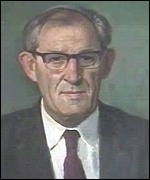
Sir Dugald Baird FRCOG was a British medical doctor and a professor of obstetrics and gynaecology. Baird was most notable and influential in calling for the liberalising of abortion. In his delivery of the Sandoz lecture in November 1961, titled the Fifth Freedom, he advocated for freedom from the tyranny of fertility.
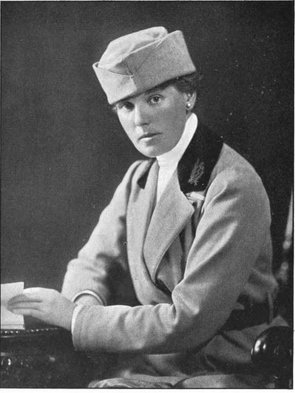
Dame Anne Louise McIlroy, known as Louise McIlroy, was a distinguished and honoured Irish-born British physician, specialising in obstetrics and gynaecology. She was both the first woman to be awarded a Doctor of Medicine (MD) degree and to register as a research student at the University of Glasgow. She was also the first woman medical professor in the United Kingdom.
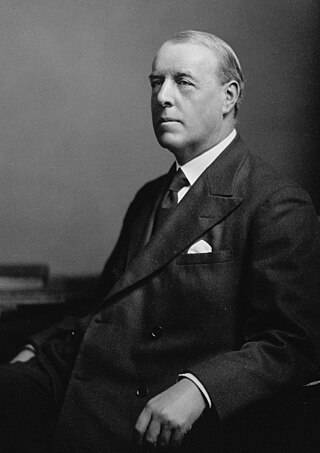
Samuel James Cameron was Regius Professor of Midwifery at the University of Glasgow from 1934 until 1942. The son of Caesarean Section pioneer Prof Murdoch Cameron, S.J. Cameron was a foundation Fellow of Royal College of Obstetricians and Gynaecologists in 1929, and for many years a member of the Gynaecological Visiting Society. A lifelong champion of the reputation of the founder of professional midwifery in the British isles, William Smellie, Cameron both named a maternity hospital at Lanark, Scotland, after him and saved Smellie's library from permanent loss.
John Martin Munro Kerr was Regius Professor of Midwifery at the University of Glasgow from 1927 to 1934. A scholar and surgeon of international acclaim he won both the Katherine Bishop Harman Prize in 1934 for his book Maternal Mortality and Morbidity (1933) and was the first recipient of the Blair Bell Medal for obstetrics and gynaecology.
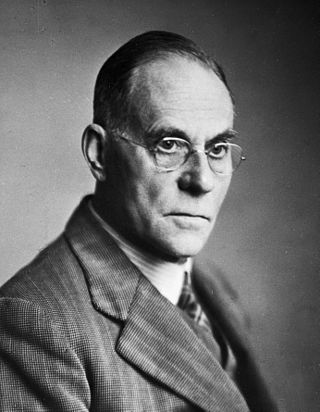
Leonard Colebrook FRS was an English physician and bacteriologist.

Dr David Berry Hart FRSE FRCPE was a Scottish gynaecological surgeon and academic.

(John) Chassar Moir CBE was Professor of Obstetrics and Gynaecology at The University of Oxford.

Alexander Hugh Freeland Barbour LLD FRSE FRCPE was a Scottish gynaecologist and noted medical author. He was President of the Royal College of Physicians of Edinburgh and co-author of the world-acclaimed Manual of Gynaecology.

James Haig Ferguson LLD FRSE FRCPE FRCSEd was a prominent Scottish obstetrician and gynaecologist. He served as President of the Royal College of Surgeons of Edinburgh from 1929 to 1931 and was president of the Edinburgh Obstetrical Society. He chaired the Central Midwives Board of Scotland and was manager of Donaldson's School for the Deaf. In 1929 he was a founder member of the British College of Obstetricians and Gynaecologists.

Sir Alexander Russell Simpson FRCPE FRSE LLD was a Scottish physician and Professor of Midwifery at the University of Edinburgh. He invented the axis-traction forceps also known as the obstetrics forceps which assisted in childbirth and reducing pain.

Sir Ewen John Maclean was a British physician, who was the first Professor of Obstetrics and Gynaecology at the Welsh National School of Medicine.

Robert Milne Murray FRSE FRCPE FRSSA was a Scottish surgeon and medical author. Specialising in gynaecology he ran the Edinburgh Maternity Hospital and Simpson Memorial Hospital, He was the first medical Electrician at the Edinburgh Royal Infirmary but refused to patent any of the devices which he created and instead openly showed the apparatus to vising European colleagues to be freely copied.
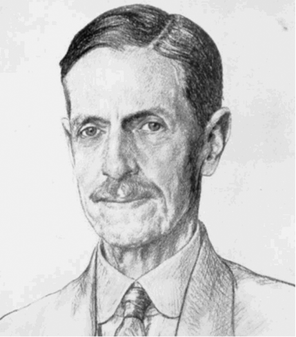
Archibald Donald was consulting gynaecological surgeon at Manchester Royal Infirmary and professor of obstetrics and gynaecology at the Victoria University of Manchester. Donald was notable for routinely sterilising catgut sutures and for a surgical repair technique for Uterine prolapse that later became known as the Fothergills Repair and later still became known as the Manchester operation

Francis James Browne (1879–1963) was professor of obstetrics and gynaecology and first director of the obstetric unit at University College Hospital, London, which was opened in 1926. He was known as "FJ".

Charles Richard Whitfield FRCOG, FRCP(G) was a Northern Irish obstetrician and gynaecologist who was a pioneer of maternal-fetal (perinatal) medicine. His primary interest was in fetal medicine, a branch of obstetrics and gynaecology that focuses on the assessment of the development, growth and health of the baby in the womb. He was also an early proponent of subspecialisation within the fields of obstetrics and gynaecology, a practice that is common today.
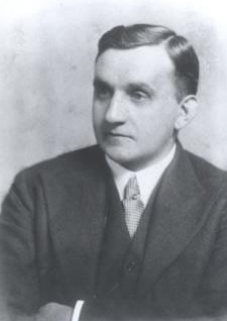
Donald Whatley Roy was a British obstetrician and gynaecologist at St George's Hospital, London.
David Shannon TD FRCOG was a British obstetrician and gynaecologist at the Royal Maternity and Women's Hospital in Glasgow and the Royal Samaritan Hospital
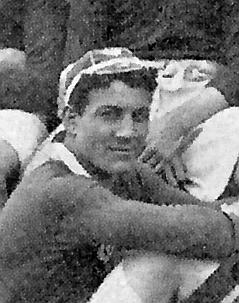
Ernest Chalmers Fahmy FRCSEd, FRCOG was a Scottish obstetrician and gynaecologist. Shortly after qualifying in medicine, he played for the Scotland international rugby team on four occasions. He became an obstetrician and gynaecologist in Edinburgh and was a founder member of the British College of Obstetricians and Gynaecologists. He served as president of the Edinburgh Obstetrical Society.
References
- ↑ Sharman, Albert (1955). "DONALD McINTYRE. M.B.E., M.D., F.R.C.O.G., F.R.C.S.E., F.R.F.P.S., F.R.S.E". BJOG: An International Journal of Obstetrics and Gynaecology. 62: 117–123. doi:10.1111/j.1471-0528.1955.tb14107.x.
- ↑ Biographical Index of Former Fellows of the Royal Society of Edinburgh 1783–2002 (PDF). The Royal Society of Edinburgh. July 2006. ISBN 0-902-198-84-X. Archived from the original (PDF) on 4 March 2016. Retrieved 6 July 2017.